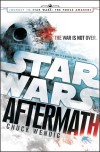The End of All Things (Old Man's War)
 Guys. Guys. I met John Scalzi last week. He didn't come to my town as part of his book tour, but he did come to one that was just about ninety minutes away, so I made a special trip to (a) buy the book, (b) get it signed, and (c) meet John Scalzi! It was definitely a squee-worthy moment, especially when he called me a jerk in front of the whole crowd!
Guys. Guys. I met John Scalzi last week. He didn't come to my town as part of his book tour, but he did come to one that was just about ninety minutes away, so I made a special trip to (a) buy the book, (b) get it signed, and (c) meet John Scalzi! It was definitely a squee-worthy moment, especially when he called me a jerk in front of the whole crowd!The End of All Things is the latest book in the Old Man's War series, and like its predecessor The Human Division, it's a compilation of shorter works that were originally published online. This time, though, the works are longer. I think this is a good thing. While I liked the idea behind The Human Division, I feel like Scalzi is better at long-form fiction than short-form fiction. I still think I prefer his stuff when it's novel-length, but with The End of All Things, he's a bit closer to that than he was with the last book.
The first story in the book, The Life of the Mind, is a brain-in-a-box story. This isn't a spoiler, though; it's mentioned in the second sentence of the story. The main character, Rafe Daquin, is a pilot who is a last-minute addition to the crew of a cargo ship, which is also taking the Assistant Secretary of State on a vacation. Since Rafe eventually winds up as a brain-in-a-box, you can probably expect that things don't go quite according to plan.
Rafe makes an appearance in the second story, This Hollow Union, but his part is important to the story; in fact, his part is the link between the two stories that makes this feel more like a novel that The Human Division. In this story, the Conclave is teetering on the brink of failure, with the two human factions playing a key role in how it plays out. This story, to me, represents the best of what Scalzi can do: political intrigue; behind the scenes machinations; and a complex sequence of events that's easy to follow.
With Can Long Endure, I was reminded that Scalzi is a liberal man. This doesn't bother me at all; I tend to agree with much of what he writes about politics and society on his blog, so it's more like reading something my Facebook friends would write. This particular story reminded me of a series of articles I've seen over the past several weeks, usually prefaced with "We have a police problem." It's also a reminder that in Scalzi's universe, even the police tend to think the way I do about things.
To Stand or Fall, the final novella, takes the themes set forward in the previous three novellas and concludes the overarching story of the book. Since this book does read more like a complete novel than The Human Division, I won't go into a lot of detail about it, but I will say that, in true Scalzi fashion, the ultimate solution involves more diplomacy than explosions, and everything that happened in the previous three novellas has an impact on how this story plays out.
There was some bonus material at the end of the book, comprised of an alternate take of the first story in the collection. It was interesting to read, especially if, like me, you're into how the creative process works, but it's also like deleted scenes or demo tracks; ultimately, you see why these things weren't the final product. I recognize that this version of the story was a rough cut, but it doesn't convey the story and events as well as was done in the final take.
Given that The Human Division ended pretty much where it started, and that The End of All Things concludes the events that began in the preceding book, I would consider these two books to be a duology of their own, best read together. Together, they take the universe of Old Man's War to a logical place (I hesitate to call it a conclusion, since the universe is ripe for more stories), and at least with this collection we see that there is a conclusion to those events.






